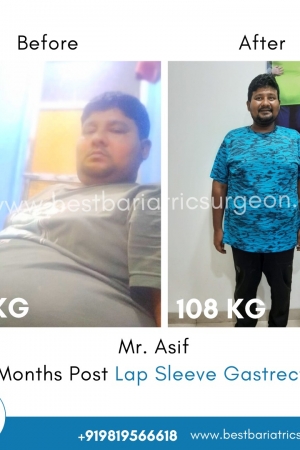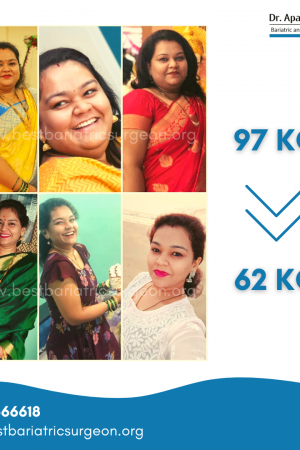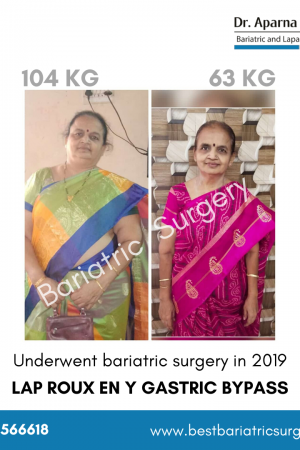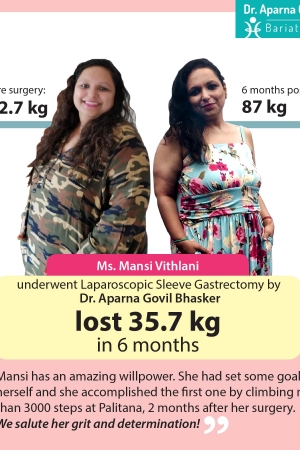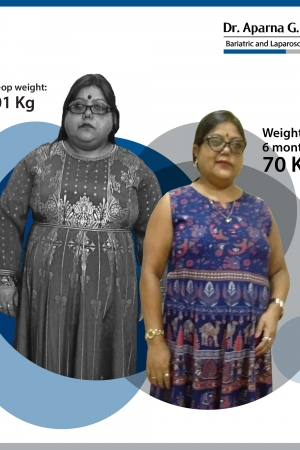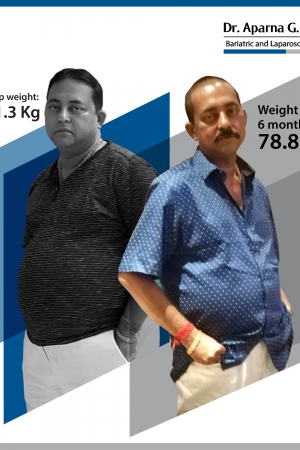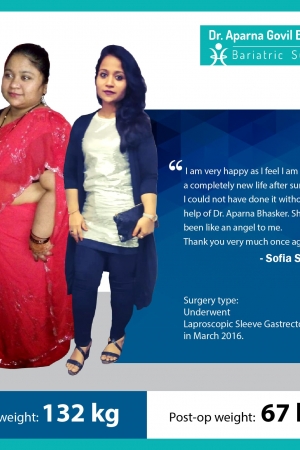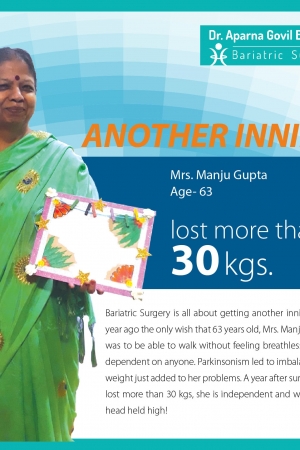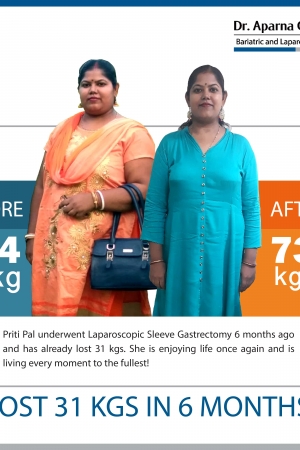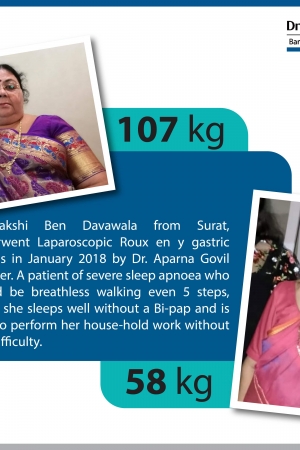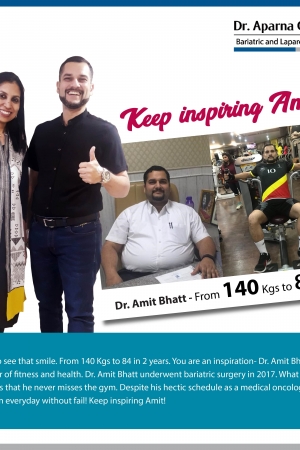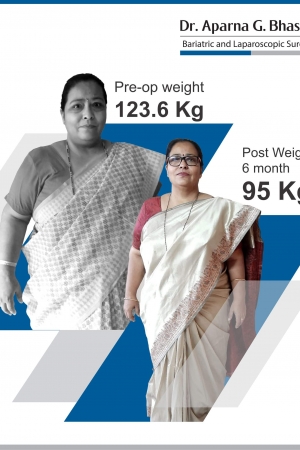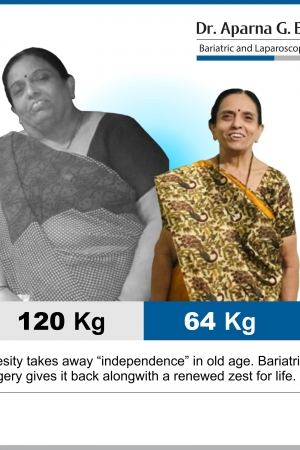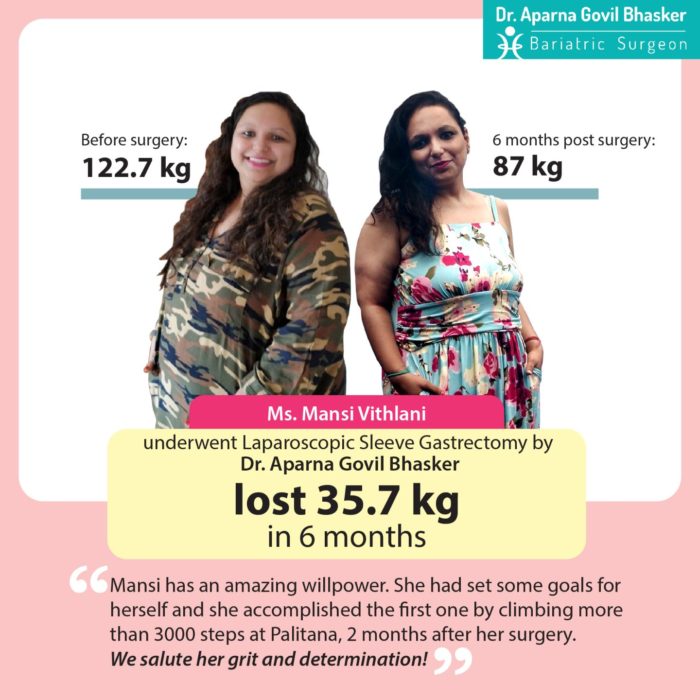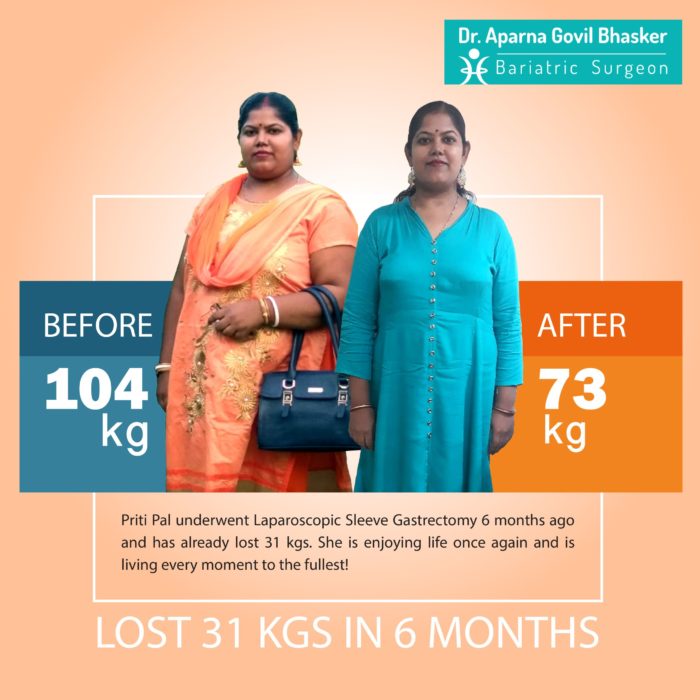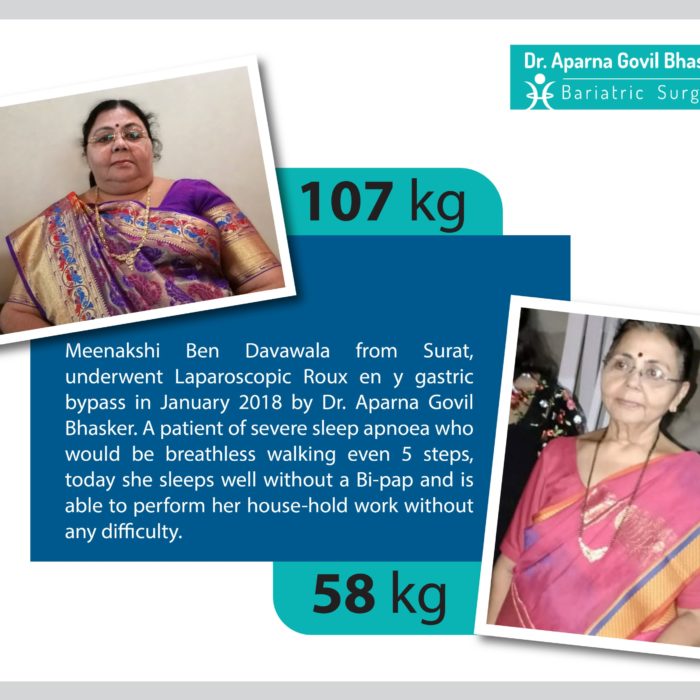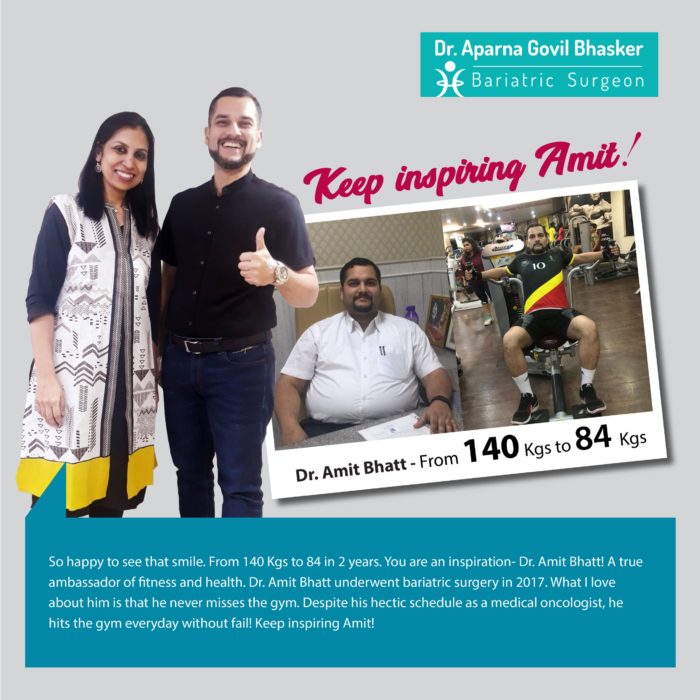
Bariatric Surgery in Thane (Weight Loss Surgery)
- Home
- Bariatric Surgery in Thane (Weight Loss Surgery)
Bariatric Surgery in Thane (Weight Loss Surgery)
“Being healthy is not about the weight you lose, it is about the life you gain.”
Morbid obesity or clinically severe obesity has emerged as one of the most dreaded diseases of this century. Even before the medical fraternity could define obesity as a disease, it has attained epidemic proportions. Today, India has the third highest numbers of people suffering from being overweight and obesity. Unfortunately, even today, obesity is not viewed as a disease and patients suffering from obesity do not get the same sympathy or attention as patients suffering from other diseases such as cancer.
People who have tried to lose weight, know how difficult it is to not only lose weight but also to maintain that weight loss. Every patient that I come across tells me that they did lose weight, but irrespective of what they did, the weight always came back and sometimes more than what they had lost. On a daily basis, we see patients who put in their heart and soul into their efforts for weight loss. They have visited every weight loss clinic, consulted celebrity dieticians, been to gyms, yoga gurus and weight loss retreats. They have tried every diet listed on the internet. Unfortunately, more often than not, they meet with disappointment and tend to yo-yo between weight loss and weight gain. This entire process can be very disappointing for the patients. It also demotivates them and pulls them down psychologically.
Unfortunately, there is no magic pill as yet which can cure morbid obesity. Today, for patients suffering from severe or morbid obesity, bariatric surgery / weight loss surgery / metabolic surgery is the only way that can lead to sustained weight loss.
Bariatric surgery/ weight loss surgery/ obesity surgery is the only proven method for sustained weight-loss in morbidly obese patients.
Our center for bariatric surgery / weight loss surgery / metabolic surgery in Thane is located at Currae Specialty Hospital, Ground floor, Highstreet cum Highland Corporate Centre, near Big Bazaar, Kapurbawdi, Junction, Thane, Maharashtra 400607
Obesity is classified as under:
Obesity is classified on the basis of Body Mass Index (BMI). BMI is a metric that tell us about what our weight should be as per our height. It can be calculated easily using a mathematical formula- [Weight in kg / Height in m2). There are many applications and it can also be easily done on Google. The obesity classification for Asian people is a little different from Western population. Asian people have a higher fat percentage and hence they tend to suffer from obesity related diseases like type 2 diabetes at a much lower weight and BMI.
| Classification for Caucasians/ Westerners(Kg/m2) | Classification for Asians
(Kg/m2) |
|
| Normal weight | 18.5 – 25 | 18.5 – 23.5 |
| Overweight | 25 – 30 | 23.5 – 27.5 |
| Class 1 obesity | 30 – 35 | 27.5 – 32.5 |
| Class 2 obesity | 35 – 40 | 32.5 – 37.5 |
| Class 3 obesity | 40 and above | 37.5 and above |
BMI Formula:
BMI= (weight in kg)/Height in m2)
Just like cancer, obesity affects every organ of the human body. People who suffer from obesity are at an increased risk of developing type 2 diabetes mellitus, high blood pressure, dys-lipidemia and heart disease. Obesity also leads to obstructive sleep apnoea, fatty liver disease, gout, joint diseases, PCOD, increased risk of venous thrombo-embolism, gall bladder stones etc. Patients suffering from obesity are also at a high risk for developing some cancers like breast and endometrial cancer in women and colon and pancreatic cancers in men.
Bariatric Surgery
Bariatric surgery or obesity surgery is the only proven method that leads to sustained weight loss in patients with clinically severe or morbid obesity. It also leads to a significant improvement in most of the associated diseases such as diabetes, high blood pressure, high cholesterol etc & decreases overall risk of heart disease. Most bariatric surgery or weight loss surgery or obesity surgery procedures lead to about 60 to 75% excess weight loss. Ofcourse, weight loss also depends on the effort put in by the patient. Lifestyle and behaviour modification after surgery help in long term weight maintenance.
Guidelines for weight loss surgery
The guidelines for surgery are based on BMI criteria. The BMI cut offs for Asian people are 2.5 points less in each category as compared to Western population.
The IFSO- APC (International Federation for Surgery for Obesity and Metabolic Disorders – Asia Pacific Chapter) guidelines for weight loss surgery are as under:
- Bariatric surgery/obesity surgery/weight loss surgery must be considered for the treatment of obesity for acceptable Asian candidates with BMI ≥ 35 Kg/m2 with or without any associated diseases.
- Bariatric surgery/metabolic surgery must be considered for the treatment of type 2 diabetes or metabolic syndrome for patients who are inadequately controlled by lifestyle alterations and medical treatment for acceptable Asian candidates with BMI ≥ 30 Kg/m2.
- Bariatric surgery/metabolic surgery may also be considered as a non-primary alternative to treat inadequately controlled type 2 diabetes or metabolic syndrome for suitable Asian candidates with BMI ≥ 27.5 Kg/m2.
Calculate your BMI:
BMI= (weight in kg)/Height in m2)
Types of bariatric surgery
There are many types and variations of bariatric procedures. Bariatric surgery in Thane performed at our hospital include:
- Laparoscopic Roux en y gastric bypass
- Laparoscopic Banded Roux en y gastric bypass
- Laparoscopic sleeve gastrectomy
- Single incision sleeve gastrectomy
- Laparoscopic adjustable gastric banding (not very popular any more)
- Endoscopic intra-gastric balloon insertion
- Laparoscopic single anastomosis gastric bypass (mini-gastric bypass)
- Laparoscopic Duodenal switch
- Laparoscopic SADI-S
- Laparoscopic revisional bariatric surgery
- UGI endoscopy
Selection of a suitable bariatric procedure
The bariatric procedure that may suit you the best, depends on multiple factors. These factors include the age, gender, weight, food habits, associated diseases, physical activity level, team and patient commitment etc. In our practice, you as the patient participate equally in the decision making. Once we evaluate you, the final decision about the type of procedure is taken after a mutual discussion between the doctor and the patient. Bariatric surgery is majorly about a lifestyle change and best results can be achieved only if the doctor and the patient work together as a team. An informed decision leads to the best results.
Preparing for bariatric surgery in Thane
Getting any surgery done is a major life decision. Trusting your doctor and the team is extremely important. We understand that surgery can be an intimidating experience for most people. We believe in hand-holding you through every step of this journey towards your surgery and recovery. We will guide and help you at every step. The process begins first, with consultations with the doctor and the team. You will then be advised to undergo tests and based on your reports and overall assessment, you along-with the doctor and the team will decide on the type of bariatric procedure that will work the best. Before the surgery, you will be on a high protein diet for a minimum of five days to one week. A pre-anesthesia check is mandatory before the surgery. Prior to surgery you may also need to see other specialists like an endocrinologist, nephrologist, chest physician, cardiologist etc based on your medical history. It is advisable to get admitted on the evening prior to the day of surgery.
Bariatric Surgery FAQ (Frequently asked questions)?
Bariatric Surgery/Obesity Surgery/ Weight Loss Surgery in india Patients Before After Photos
Expected weight loss after bariatric surgery
Bariatric surgery in Thane or weight loss surgery in Thane leads to significant weight loss. On an average after any bariatric procedure most patients will lose about 65 to 75% of their excess weight. This could be less or more depending on many factors like post-operative diet, efforts put in terms of exercise, follow up by the bariatric team, associated co-morbidities, drug intake etc. Surgery leads to a lot of improvement in the quality of life of the patient and most patients are able to maintain atleast 50% of excess weight loss at the end of 5 years, which is much higher than any other method of weight loss.
Improvement in associated diseases
Bariatric surgery in Thane leads to a significant improvement in associated co-morbidities. Type 2 diabetes becomes better in 80 to 98% of patients. A significant number of patients do not need to take any medications for diabetes after the surgery. Ofcourse, this also depends on the duration of diabetes, c-peptide levels, age and BMI of the patient. High blood pressure improves in almost 70% of the patients. There is an overall 80% improvement in metabolic syndrome. Surgery also leads to a significant improvement in PCOS, joint diseases, gout, obstructive sleep apnoea, fatty liver, infertility, COPD etc. Bariatric surgery leads to an overall risk reduction for heart disease and decreases mortality.
Follow up after bariatric surgery in Thane
Diligent follow up is the key to success after bariatric surgery. After surgery, you will need to visit us at 1 week, 1 month, 3 months, 6 months and 1 year. In the second year you will visit us two times and once in a year thereafter. Surgery leads to many changes in your lifestyle, dietary habits, exercise schedule etc that will need continuous support and counselling. Patients who follow up regularly, tend to do better and get better results.
The biggest positive of coming to us for your surgery is our personalized care. Every patient is equally important for us and we assure you that the smallest of queries will be addressed at the earliest. The team is supportive and approachable.
It is also extremely important for the patient to be mentally prepared and be positive before undergoing a surgery. A positive attitude goes a long way in getting good results after surgery. We request you to be positive and have faith. We wish you all the best for your journey of weight loss. Cheers! to being a different you.
Last but not the least- “There is no shortcut. It takes time to create a better and stronger version of yourself.”
Patient Stories
- Mansi considered bariatric/ weight loss surgery as she was suffering from grade III obesity with a Body Mass Index (BMI) of 47.5 Kg/m2. At 121.7 Kg she was not able to exercise much due to severe knee pain. She would feel breathless on exertion. Her sonography revealed grade II fatty liver. She underwent a Laparoscopic Sleeve Gastrectomy on 14th of November 2018. She knew that bariatric surgery was not a shortcut to weight loss, and worked very hard on changing her lifestyle post surgery. She exercises for 2-3 hours daily and follows a great diet regime. She has an amazing will power as she was able to accomplish her goal of climbing more than 3000 steps at Palitana just after 2 months post surgery. She lost 35.7 Kg in 6 months, we salute her grit and determination!
- Priti was 104 kg and suffered from high cholesterol, knee & back pain. She also had grade II fatty liver. She underwent a Bariatric/weight loss surgery in the form of Laparoscopic Sleeve Gastrectomy on 22nd of December 2018. In the last 7 months her weight has come down to 73 Kgs. Her cholesterol levels and knee pain are under control and fatty liver has resolved. She is extremely happy with the way she looks & feels now and loves getting all the "likes" and admiration on her pictures posted on social media. Her weight loss journey will continue and she will lose more weight in the coming months.
- When she came to us, she was suffering from diabetes mellitus, high blood pressure, severe sleep apnoea and gout. She had already undergone a total knee replacement and was advised to use Bi-pap on a regular basis. Losing weight had become crucial and critical. She underwent a Bariatric/Weight loss surgery in the form of Laparoscopic Roux En Y Gastric Bypass on 24th of January 2018 and lost 47 kgs in 1 Year. Her present weight is 60 Kg, she is off Bi-pap machine, diabetes free and came down to 2 medicines from 4 for control of high blood pressure. She feels much more independent, is able to do all her household chores and religiously goes for a brisk walk daily for an hour. She is the lifeline of her family and loves her new self.
- Dr. Bhatt is a practising medical oncologist in Pune. He struggled with obesity for many years. At 140 kgs, he decided to undergo a Laparoscopic Banded Roux en Y Gastric Bypass in Feb 2017. He has lost 55 kgs. Dr. Bhatt has adopted diet and lifestyle modification as a way of life and is seen in the gym every evening despite his busy schedule. He has become a fitness role model for everyone around him and that includes his patients. One of the most inspiring journeys.
Dr. Aparna Govil Bhasker
Bariatric and Laparoscopic Surgeon
Currae Specialty Hospital
Ground floor, Highstreet cum Highland Corporate Centre, near Big Bazaar, Kapurbawdi, Junction, Thane, Maharashtra 400607
Mobile: +919819566618
Email: draparnagovil@gmail.com , info@bestbariatricsurgeon.org
Website: www.bestbariatricsurgeon.org www.aparnagovilbhasker.com
Social Media:
Facebook- https://www.facebook.com/draparnagovilbhasker/
Linked in- https://www.linkedin.com/in/dr-aparna-govil-bhasker-82836b34/
Twitter- https://twitter.com/aparnabhasker
Instagram- https://www.instagram.com/draparnagovilbhasker/?hl=en
You tube- https://www.youtube.com/user/aparnagovil/videos?view_as=subscriber
About Dr. Aparna Govil Bhasker
Dr. Aparna Govil Bhasker is an accomplished Bariatric Surgeon and Laparoscopic GI Surgeon. Extremely passionate about her field of specialization. She completed her MBBS and MS in General Surgery in 2006, from Mahatma Gandhi Institute of Medical Sciences (MGIMS), Sewagram. Set up in 1967 by none other than the first health minister of India, Ms. Sushila Nayar, MGIMS is deeply rooted in Gandhian ethics. Read more


Surgeon in India


Bariatric Surgery: Pros and Cons
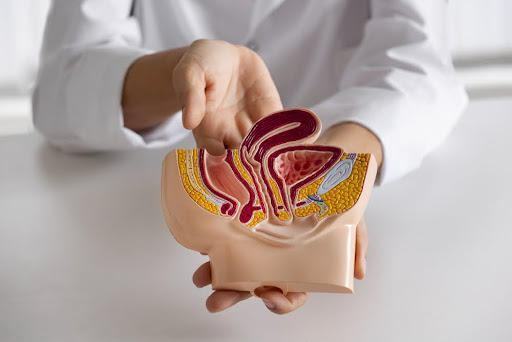
Types of Hernias and Their Treatment Options Explained
- Intra-Gastric Balloon Insertion Surgery
- Laparoscopic Adjustable Gastric Banding Surgery
- Gastric Sleeve Surgery / Laparoscopic Sleeve Gastrectomy
- Single Incision Sleeve Gastrectomy Surgery
- Laparoscopic Roux-en Y Gastric Bypass Surgery
- Laparoscopic Banded Roux-en Y Gastric Bypass Surgery
- Laparoscopic Mini Gastric Bypass Surgery /Omega Loop Bypass
- Laparoscopic Sleeve Gastrectomy with Duodeno-Jejunostomy Surgery
- Laparoscopic Duodenal Switch Surgery
- Laparoscopic Sleeve Gastrectomy with Duodenal Ileostomy (SADI) Surgery
- Laparoscopic Revisional/Redo Bariatric Surgery
- Metabolic Surgery for Diabetes
- Terms & Conditions
- Privacy Policy
- Sitemap


